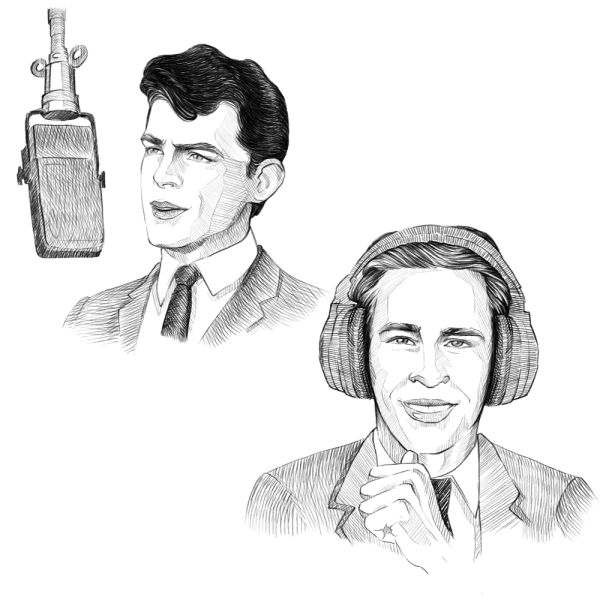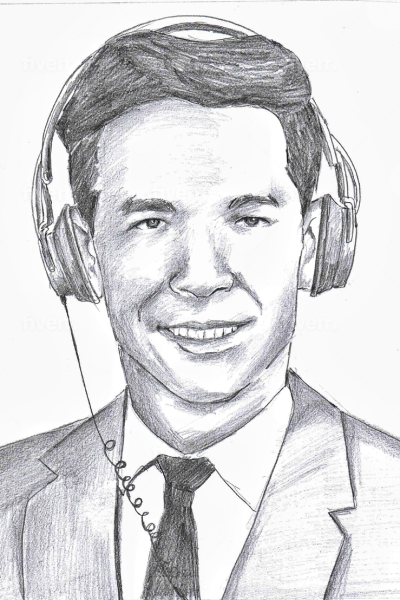One Chance at Bat: The B. J. Thomas Story
Written by the staff of Anders Products: Made in America since 1950
Note: We believe the facts presented in this story to be true. If you have any additions or corrections, please use the contact box below.
Listen Now
Train Ride
The opening lyrics to B.J. Thomas’s first hit single Billy and Sue are: “This is a story about Billy and Sue. They were in as love as any two and yet Billy had to die and when you hear the reason why, you’ll hang your head and cry“.
Possibly after you read the story behind this song, you may shed yet another tearand
This story starts out on a train ride from Houston Texas to Nashville Tennessee. The year is 1963. Amongst the passengers are two young men from Rosemont, Texas, a suburb northwest of Houston, and the trip has been paid for by a big record company out of New York City. These two are members of the local high school rock’n’roll band known as the Triumphs.
The record company shows interest in a particular song that the Triumphs had recently pressed into a 45. While the song had received some air-play on the local Houston stations, it went nowhere
One Chance
The song is about a young man who marries his high school sweetheart, Sue. He goes to war, probably the Korean as the Vietnam war is yet to happen. There he regularly receives letters from Sue, pushing him on, helping him survive. Meanwhile, back home, Sue starts cheating on him and the letters cease, causing Billy to lose his will to fight and his will to survive. Just as Billy begins to lose all hope he receives one final letter from Sue, his “Dear John” letter. So shocked and saddened by the news, he jumps up in front of enemy fire and is shot dead.
One of these fellows on the train ride to Nashville is high-school band-mate Mark Charron, the song’s composer. The other is B.J. Thomas.
Somehow, a copy of Billy and Sue makes its way to New York, where no doubt the record company is less interested in the band or its lead singer, Thomas, and rather hungry for gaining exclusive music rights to what is yet another “story song.” This type of format had gained a lot of traction on the recent pop-charts.
Examples which come to mind are, “Last Kiss” by J. Frank Wilson and “Laurie (Strange Things Happen)” by Dickey Lee.
Yes, young aspiring musicians are the fools and fodder which recording companies then, and now, consume as they are perpetually on the hunt given their silent and solemn mantra to preferably pay nothing for the talent. But if you can’t get that, then settle for next-to-nothing.
In regard to Thomas, the Triumph’s version of Billy and Sue was mixed such that he was way in the back and the instruments up front. Frankly, it was hard to hear what talent he had, if any.
Test Recording
Moreover, what do you think are the chances that the lead singer from a local high school rock’n’ roll band would rise up to the level of national and then later international fame? Lottery odds? No, probably not even that good.
But Thomas has a trick up his sleeve that would change the course of his life journey.
Arriving in Nashville the record company arranged for a test recording of Billy and Sue with Thomas now placed in front of a studio band.
So far nothing special, but here is where Thomas plays his card: His one chance at bat.
For you see Charron had very carefully crafted his song to take every advantage of Thomas’s vocal range, his strength as a singer or, simply put, his energy to sing.
Please click the youtube link below and listen to this test session as recorded in Nashville in 1963.
Link to the song:
As you can hear, with Charron’s gift Thomas is able to lean into this song with 120% of his talent to sing.

The Big Break
While the company haves what it wants, the rights to the song, the executives back in New York prepare for this version of the song to fail. So, they opted to invest as little money as possible into the Thomas/Charron experiment and simply mastered the test recording and released it under the Warner Brothers label.It turns out they are right: Like the local Houston test, Billy and Sue fails again, but this time on the national stage.
In retrospect this comes as no surprise as top on the popcharts of that era was “I Want to Hold Your Hand” by the Beatles. The lyrics of Billy and Sue were probably just too close to the truth for the musical tastes of the early 1960s.
Now it is 1966 and America starts to become a different place.
The Vietnam War is raging and at the same moment the sexual revolution is getting into full swing.
Somehow, Bill and Sue makes it onto the play list of the Armed Forces Radio Service in Nam. Sadly, it is an immediate success.
Why? Young soldiers there, hanging on by the thinnest of threads, are also kept moving forward with the letters from their loved ones back home. Then, only to be devastated by their own “Dear John” letter.
This song speaks to their truth.
Released, now for the third time, Billy and Sue makes it up to number 36 on the national charts back home.
Eventually, over a million copies of Billy and Sue are sold. It still receives airplay and downloaded streams today, some sixty years later.
For Thomas, his future is assured. He will go on to sell more than 70 million albums worldwide with eight No. 1 hits.
Tragedy in Nashville
For Charron, things end in tragedy.
He goes on to become a professional songwriter with some success writing songs for the Partridge Family, Bill Anderson and the Vogues. But he is besieged with royalty problems and forced fight to be paid for his work. This situation is particularly serious as by this time he has a family with young children. His situation becomes so egregious that by the mid 1970’s he is spending plenty of time in court. In fact, so acrimonious are these battles that they were cited by the United States Supreme Court (1).
Charron’s ending came too soon at age 52 in Nashville. While the exact nature of his death is not clear (2, 3) , it would appear that the soldier in his song and his own passing have a lot more in common than you might expect. By that I mean he too may have died from a broken heart and his ending was swift.

References
- Official Reports of the Supreme Court – Page 763
United States. Supreme Court · 1980
2. Billboard Magazine July 9th 1994 Page 83
3. The encyclopedia of rock obituaries by Talevski, Nick, Page 64